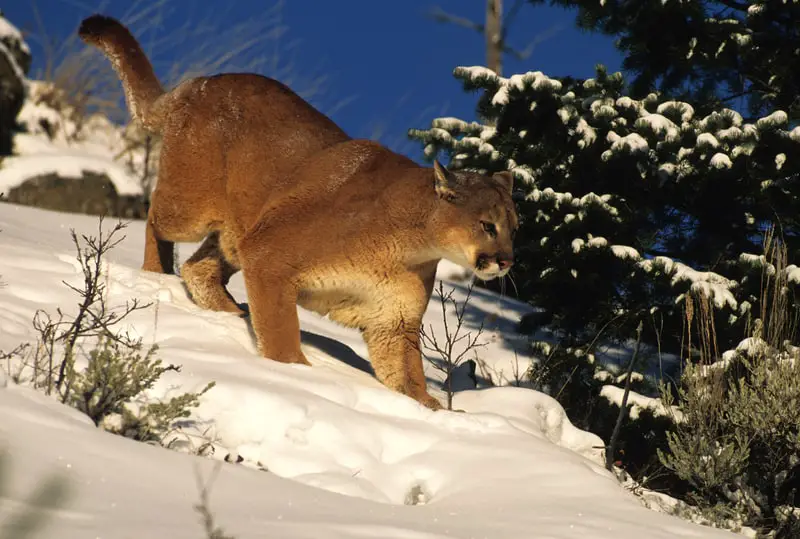Some people wonder if Mountain lions hibernate as bears do, for instance. The short answer is no; cougars do not hibernate in the wintertime. In fact, winter is the season when you are most likely to see a Mountain Lion in the wild.
What are the reasons for this?
- Their prey animals are much more concentrated and visible on winter ranges. Their predators, cougars, are right there with them.
- A cougar’s paws act like snowshoes to help them travel on top of the snow. By contrast, their prey animals, deer, and elk, for example, struggle to get around in deep snow, making them much easier for the cougar to catch.
- In the evolutionary timeline, cats developed a short snout and, with it, extra biting force. In developing a shorter snout, they sacrificed olfactory potency. In other words, they don’t have the greatest sense of smell in comparison to other predators. For this reason, in the non-winter months, Mountain lions primarily wait in ambush for their prey to come to them. This makes them much more secretive and elusive in the non-winter months.
- Mountain lions have excellent eyesight. In the wintertime, they are able to hunt by sight and then run their prey down in the snow.
- Researchers have found that mountain lions will also follow their prey’s tracks by sight for miles in the snow until they catch up with them.
- A Canadian study has found that it’s not that cougars make more kills in the wintertime. In fact, the inverse is true. The methods they employ in the winter make them more likely to be spotted by humans than any other time of year.
They Don’t Hibernate So What Are Mountain Lions Up To In The Winter Time?
Adult mountain lions are formidable predators. They account for around 18 pounds of biomass and consume around 10 pounds of meat per day. To do this, they need to kill a large ungulate animal almost once a week. Consequently, they need to be where their prey animals are.
In North America, in the winter, in areas where prey animals migrate to winter ranges, Mountain Lions migrate right along with them. That may entail a change in elevation or a complete change in location. For example, in the Sierra Nevada Mountains of California, mountain lions follow mule deer herds from the western to the eastern slopes and vice versa with the seasons.
In the South American country of Argentina, this does not hold true. When the Puma’s primary prey, the guanaco, migrates for the winter, Pumas do not follow them.
In areas where extreme winter conditions do not exist, like Florida, for example, prey animals likely don’t move around much with the seasons. They’re also not hindered by winter snow, so some of the things we’ve been talking about that are relevant to a cougar in the western United States, Canada, or Argentina will not hold true for a Florida panther.
In Conclusion
Whether they are known as cougars, mountain lions, panthers, or pumas, these animals do not hibernate and are just as active or more so than they are throughout the rest of the year.
Also, read Living with Mountain Lions.


